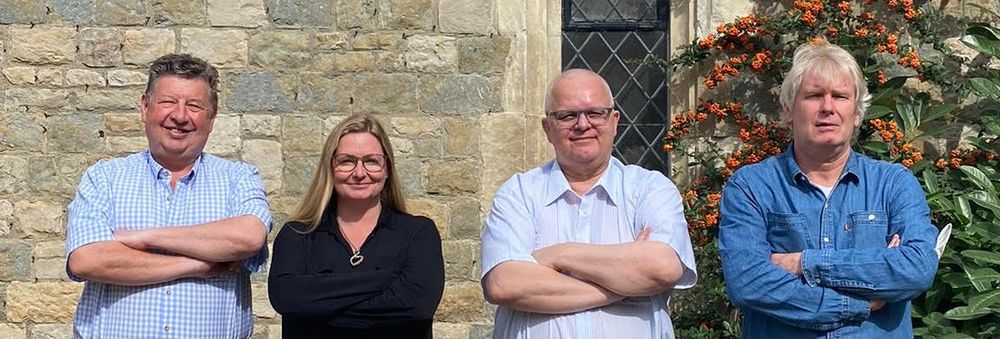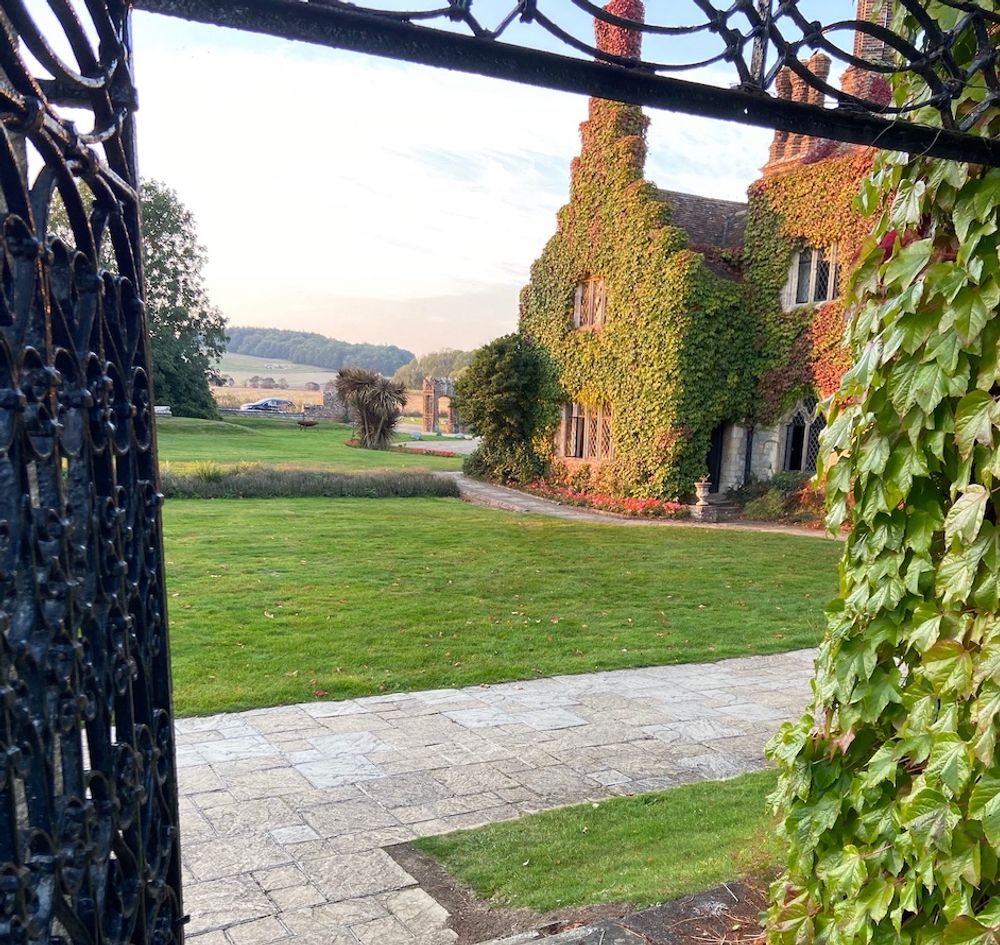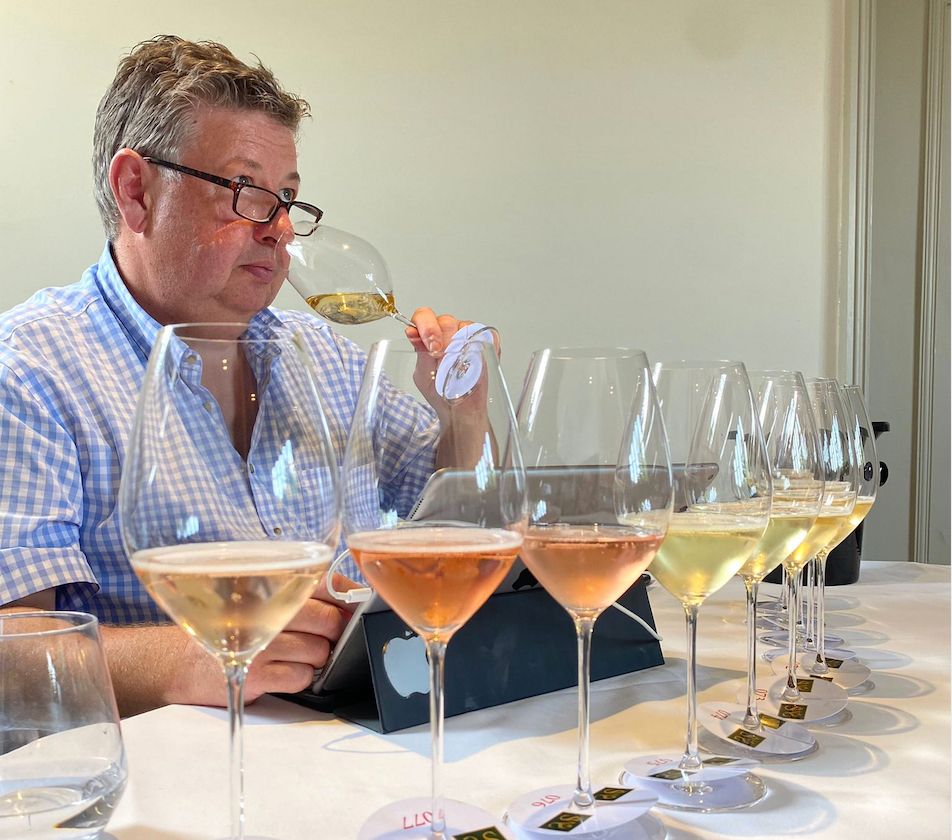You have been involved with CSWWC since 2018 as its ambassador, you also took over the fourth judge (reserve judge) for the 2021 Championships – can you explain the two roles?
Yes, Tom [Stevenson] brought me on board to bring my knowledge of New World Sparkling to the table and to encourage more entries into the Championships. Having travelled extensively to South Africa, Australia and New Zealand I had already established a good rapport with many winemakers with my “Sparkling Sunday” Roadshow that I set up some 20 years ago.

The CSWWC judging team: Roger Jones with Essi Avellan MW, Tom Stevenson and George Markus
By being ‘reserve judge’ it ensures the CSWWC always has a back up judge to the three main judges in case of illness. This year has seen both myself and Nick Baker (founder and managing director of The Finest Bubble) fill this role, and although the reserve Judge participates in the scoring, his score is not counted, although his interaction and support is encouraged especially if there is a tight call on the scores.
I understand that you are in ‘camp’ for the duration of the judging – how does that work?
Yes, for two weeks we go into isolation to concentrate fully on the judging. This year it was hosted at Champneys in Kent, and besides the judges, the full team behind the Championships are there: Orsi Szentkiralyi (tasting quality control director); Harriet Wright (competition steward); and Donald Mckenzie (logistics) together with James and Paul who ensure everything is run smoothly. Tom’s co=]director Rachel Davey looks after the PR whilst fellow director Eva Callaghan, is in charge of administration.
Because we are basically in lockdown. It is essential that there are plenty of activities and events for the team to participate in after the daily judging, and this comes under my watch. Luckily Champneys had plenty of facilities including outdoor and indoor pools and ample grounds, and the weather was glorious. We also had a very good pianist and singer (Paul) in the group, together with quiz nights and pub games all these kept the campers happy, notwithstanding some excellent wine dinners with even a guest appearance by ex Dom Perignon chef de cave, Richard Geoffroy.
How many wines do you judge daily, and how important are magnums to the competition?
We taste about 120 wines a day, by origin and style, then gold medals are re-tasted to get Best in Class. These then go forward for the Regional Champion, then National. All Best in Class go forward for the World Champion by style (six categories) and finally The Supreme World Champion and select Special Awards.
Magnums account for a large portion of entries, and whilst the judges have no inclination of bottle size it is a proven point that magnums always do better. This again was highlighted this year when Dermot Sugrue’s Trouble with Dreams 2014 in Magnum received a Gold where the same wine in bottle in a previous year received a bronze.

It’s not all work, work, work. Roger Jones is in charge of the post-judging entertainment and food
So it’s not all about prestige Champagne?
Tom wants this competition to be inclusive, and, of course, Champagne is hugely important to the Championships, hence the star quality of the entries, but it is important to highlight the quality that we are getting from sparkling wines from across the globe.
We were delighted to see Japan receive a silver, and Horton Vineyard in Virginia getting a medal for their Sparkling Viognier. Frexienet has been flying the flag for Spain, showcasing the quality of Cava, whilst there were many new golds from Australia.
How does it compare to judging from the other competitions that you judge?
All four judges including the reserve judge try every single entry. This is quite unique, and as noted we try some 120 per day before having fresh pours of the gold awards to look at higher awards. Getting a gold is pretty tough, and the bar is set at a high level. Judging a Lambrusco or Prosecco is judged different from a prestige Champagne, as one is looking for different attributes, although in the final round all these wines are judged together, if they have succeeded in getting through.
Equally important is to be educated when tasting other regions, especially from styles that one would not generally drink. Franciacorta and Trentodoc are well respected in Italy, so it was good this year to see a star winery from Sicilia hit the golds. Likewise last year Bulgaria did well, whilst this year, Carassia from Romania has done exceptionally well.

Champneys: home of the CSWWC judging…
It is also worth noting that the CSWWC has a unique system. The tasting quality control director, Orsi, shadows the judges’ one flight behind, opening up at least one bottle of every bronze, commended and no award wines, plus all silver-graded deluxe Champagnes to compare against the one judged, searching for any bottle variation. New samples of any suspect wines are assigned a different wine code and fed back into the blind tasting schedule to ensure that they are re-evaluated. This is a great back up system, although I noted this year that very few re-pours were sent back to the judges.
It is a very rare privilege to be able to be involved with the CSWWC and to judge, and to experience so many outstanding wines, and certainly with the Prestige Category for Champagne these are opportunities that you will always savour. It is also frightening to be marking such prestigious wines, and always interesting to see the bottles unwrapped at the end. I have now become accustomed to only drinking sparkling wine from a magnum, which does have its downfalls, as well as the pleasure.
- You can find our more about CSWWC and who has won what in the 2021 awards at its website here.
- You can see the full list of Best in Class winners on The Buyer here.






























